Cheyne Surname Ancestry ResultsOur indexes 1000-1999 include entries for the spelling 'cheyne'. In the period you have requested, we have the following 303 records (displaying 21 to 30): Single Surname Subscription | | | Buying all 303 results of this search individually would cost £1,560.00. But you can have free access to all 303 records for a year, to view, to save and print, for £100. Save £1,460.00. More... |
These sample scans are from the original record. You will get scans of the full pages or articles where the surname you searched for has been found. Your web browser may prevent the sample windows from opening; in this case please change your browser settings to allow pop-up windows from this site. Payments by the English crown
(1370)
The Exitus or Issue Roll of the Exchequer, compiled by the Clerk of the Pell, recorded all issues or payments made by the English crown: presents of plate and jewellery to foreign nobility; household payments to officers and servants; wardrobe payments; alms; payments for the upkeep of royal palaces, manors, residences and chapels; repayments of loans to the king; payments to messengers and couriers; wages of mercenaries; the upkeep of the navy; ransoming of hostages; maintenance of castles, forts, garrisons and fortifications; salaries of judges and other officers of the courts of Chancery, Exchequer, King's Bench and Common Pleas; as well as a host of miscellaneous other items. This is a translation of the text of the roll for the 44th year of the reign of king Edward III, when Thomas de Brantingham, Bishop of Exeter, was Lord High Treasurer of England.
CHEYNE. Cost: £4.00.  | Sample scan, click to enlarge

| Inhabitants of London
(1352-1374)
Letter Book G of the City of London contains enrolments of recognizances between inhabitants, particularly citizens, for sums of money lent or due; grants of pieces of land or property; and various records relating to the city administration.
CHEYNE. Cost: £4.00.  | Sample scan, click to enlarge
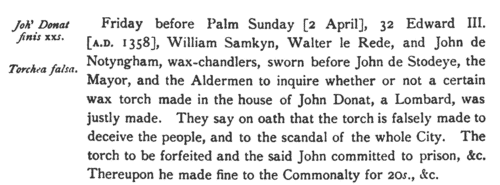
| London, Essex and Hertfordshire clerks, clerics, monks and clergy
(1361-1374)
Ordinations to first tonsure, acolytes, subdeacons, deacons and priests, from the register of bishop Simon de Sudbury of London. London diocese covered Middlesex, Essex and part of Hertfordshire; the ordinations also attracted many persons from distant dioceses bearing letters dimissory from their ordinaries, and these are duly noted in the text. Many of these clerks would not go on to obtain benefices and remain celibate. The lists of subdeacons, deacons and priests state the clerks' respective titles, i. e., give the names of the person or religious house undertaking to support them. Monks and friars ('religious') are listed separately, and the lists of subdeacons, deacons and priests are also separated into beneficed and not beneficed (or 'not promoted'). The acolyte lists are unusual in giving a parish or diocese of origin.CHEYNE. Cost: £6.00.  | Sample scan, click to enlarge

| Fine Rolls
(1369-1377)
The fine rolls of the 43rd to 51st years of the reign of king Edward III record part of the government administration in England, with orders sent out day by day to individual officers, and commitment of particular responsibilities and duties. There is also some material relating to Wales, Scotland, Ireland and the English possessions in France. CHEYNE. Cost: £4.00.  | Sample scan, click to enlarge

| Inhabitants of Cheshire and North Wales
(1370-1379)
The county of Cheshire had palatine status, being in some measure independent of the rest of England: moreover, from the Statute of Wales of 1284, after king Edward I's subjugation of North Wales, until the union of England and Wales in 1536 to 1543, much of the administration of North Wales (county Flint in particular) was directed from Chester. When the Chester Recognizance Rolls were moved from Chester to the Public Record Office, they were placed among the Welsh Records. These rolls, so called because they do include recognizances (of debts &c.) among their contents, are in fact the Chancery Rolls of the palatinate, containing enrolments of charters, letters patent, commissions and other documents issued under the seal of the palatinate. Deeds and other evidences of a private nature were also enrolled on them. A calendar of the Recognizance Rolls from their commencement to the end of the reign of Henry IV was prepared by Peter Turner and included in the 36th Annual Report of the Deputy Keeper of the Public Records in 1875. We have now indexed this, dividing the enrolments into decades. This is the period from the 43rd year of king Edward III to the 3rd year of king Richard II.CHEYNE. Cost: £6.00.  | Sample scan, click to enlarge
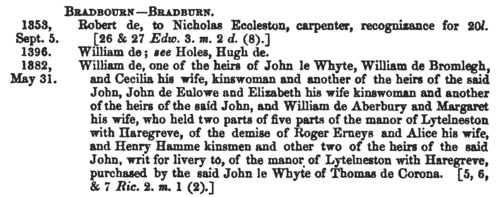
| Devon and Cornwall clerks, clerics, monks and clergy
(1370-1382)
Ordinations to first tonsure, acolytes, subdeacons, deacons and priests, from the register of bishop Thomas de Brantyngham of Exeter. Exeter diocese covered the counties of Cornwall and Devon. Some of these clerks would go on to obtain benefices and remain celibate. The lists of subdeacons, deacons and priests state the clerks' respective titles, i. e., give the names of the person or religious house undertaking to support them. Monks and friars ('religious') are bracketed separately as such.CHEYNE. Cost: £6.00.  | Sample scan, click to enlarge

| Fine Rolls
(1377-1383)
The fine rolls of the 1st to 6th years of the reign of king Richard II record part of the government administration in England, with orders sent out day by day to individual officers, and commitment of particular responsibilities and duties. There is also some material relating to Wales, Scotland, Ireland and the English possessions in France. CHEYNE. Cost: £4.00.  | Sample scan, click to enlarge

| Inhabitants of Cheshire and North Wales
(1380-1389)
The county of Cheshire had palatine status, being in some measure independent of the rest of England: moreover, from the Statute of Wales of 1284, after king Edward I's subjugation of North Wales, until the union of England and Wales in 1536 to 1543, much of the administration of North Wales (county Flint in particular) was directed from Chester. When the Chester Recognizance Rolls were moved from Chester to the Public Record Office, they were placed among the Welsh Records. These rolls, so called because they do include recognizances (of debts &c.) among their contents, are in fact the Chancery Rolls of the palatinate, containing enrolments of charters, letters patent, commissions and other documents issued under the seal of the palatinate. Deeds and other evidences of a private nature were also enrolled on them. A calendar of the Recognizance Rolls from their commencement to the end of the reign of Henry IV was prepared by Peter Turner and included in the 36th Annual Report of the Deputy Keeper of the Public Records in 1875. We have now indexed this, dividing the enrolments into decades. This is the period from the 3rd to the 13th years of king Richard II.CHEYNE. Cost: £6.00.  | Sample scan, click to enlarge
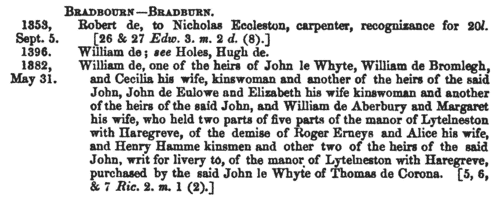
| Kent Charters
(1380-1389)
A large accumulation of documents preserved in the Bodleian Library, Oxford, formerly constituted the antiquarian collections of Anthony a Wood, Roger Dodsworth, Ralph Thoresby, Thomas Martin of Palgrave, Thomas Tanner bishop of St Asaph, Dr Richard Rawlinson, Richard Furney archdeacon of Surrey, and Richard Gough. A calendar of these was prepared by William H. Turner and published in 1878 under the title 'Calendar of Charters and Rolls preserved in the Bodleian Library'. The word 'charters' is here used in a very general sense, including virtually any manuscript or copy of a manuscript, but the bulk of the contents consists of mediaeval deeds of conveyance. Turner's calendar deals with each briefly, naming the principal parties and the nature of the deed, but hardly ever lists the witnesses. Many of these charters were undated (dating of deeds did not become standard until around 1350) or so damaged or defective ('mutilated' is Turner's usual description) as no longer to display a legible date. However, he contrived, from the style of the script and/or the nature of the contents, to estimate dates in such cases. The sample scan is from the start of the Bedfordshire list.CHEYNE. Cost: £4.00.  | Sample scan, click to enlarge
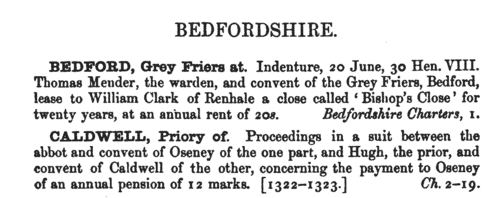
| Hampshire and Surrey clerks, clerics, monks and clergy
(1394)
Ordinations as acolytes, subdeacons, deacons and priests, from the register of bishop William de Wykeham of Winchester. Winchester diocese covered Hampshire and Surrey; the ordinations also attracted many persons from distant dioceses bearing letters dimissory from their ordinaries, and these are duly noted in the text. Many of these clerks would not go on to obtain benefices and remain celibate. The lists of subdeacons, deacons and priests state the clerks' respective titles, i. e., give the names of the person or religious house undertaking to support them. Monks and friars are indicated ('f.' = brother). The acolyte lists usually give parish of origin or title. The sample scan is from 1404.CHEYNE. Cost: £6.00.  | Sample scan, click to enlarge
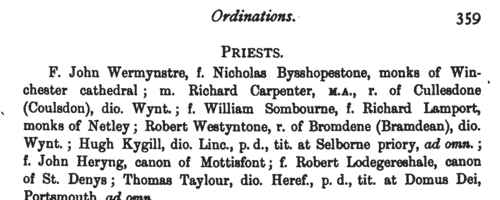
|
Research your ancestry, family history, genealogy and one-name study by direct access to original records and archives indexed by surname.
|












